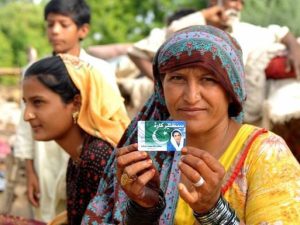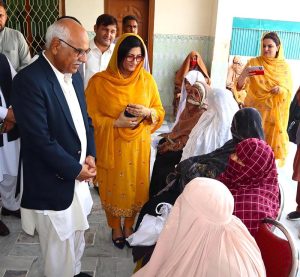The Benazir Income Support Programme (BISP) has long been a beacon of hope for millions of Pakistan’s impoverished households. Launched in July 2008, the program has evolved to become one of the country’s most extensive social safety nets. As we delve into 2024, BISP continues its mission to alleviate poverty, although it faces significant hurdles, including corruption and the need for more efficient targeting.

Current Financial Assistance in 2024
In 2024, BISP provides monthly financial assistance of PKR 2,500 per eligible family. This amount, though modest, aims to help families cover essential needs such as food, clothing, and basic healthcare. Over the years, the cash transfer amount has been periodically adjusted to account for inflation and the rising cost of living. This financial aid is primarily directed towards female heads of households, underscoring the program’s commitment to women’s empowerment.
Corruption and Fraud: The Dark Side of BISP

Despite its noble objectives, BISP has not been immune to corruption and fraud. The program’s expansive scale and the substantial funds involved make it a target for malfeasance. One of the most pressing issues in 2024 is the registration of fake identities to siphon off funds.
1. Fake ID Registrations:
Corrupt individuals and networks have exploited loopholes in the BISP system to create and register fake identities. These fraudulent entries are then used to claim financial assistance meant for genuine beneficiaries. This not only diverts funds away from those in need but also undermines the credibility and effectiveness of the program.
2. Ghost Beneficiaries:
The phenomenon of “ghost beneficiaries” — non-existent individuals listed as recipients — has plagued BISP. These ghost beneficiaries often exist only on paper, with corrupt officials or middlemen pocketing the disbursed funds. In some cases, actual beneficiaries are asked to return a portion of their assistance as a “commission” for processing their claims.
3. Collusion and Bribery:
Collusion between corrupt officials and fraudsters has exacerbated the issue. In certain instances, bribes are exchanged to ensure that fake IDs are processed and approved. This collusion not only drains the program’s resources but also fosters a culture of corruption that is hard to eradicate.

Government Efforts to Combat Corruption
Recognizing these challenges, the Pakistani government has intensified efforts to root out corruption within BISP. Several measures have been implemented to enhance transparency and accountability:
1. Biometric Verification:
One of the most significant steps is the introduction of biometric verification for beneficiaries. This system requires beneficiaries to provide fingerprints or other biometric data, which is then matched against national databases to ensure authenticity. By doing so, the government aims to eliminate fake identities and ensure that assistance reaches the intended recipients.
2. Regular Audits and Monitoring:
BISP has also increased the frequency and rigor of its audits. Regular audits are conducted to identify discrepancies and irregularities in the disbursement of funds. Moreover, the program has established robust monitoring mechanisms to oversee the distribution process and promptly address any anomalies.
3. Public Reporting Mechanisms:
To empower beneficiaries and whistleblowers, BISP has set up public reporting mechanisms. These channels allow individuals to report suspected fraud or corruption anonymously. The information gathered through these reports is then investigated by dedicated anti-corruption units within the program.
Achievements and Continued Impact
Despite the challenges, BISP’s impact on poverty alleviation remains significant. In 2024, the program continues to provide crucial support to millions of families, helping them navigate economic hardships. By targeting women as primary recipients, BISP has also contributed to improving women’s socio-economic status and decision-making power within households.
1. Educational Support:
The Waseela-e-Taleem initiative, a component of BISP, offers additional financial incentives to families that send their children to school. This initiative has led to increased school enrollment and attendance among children from low-income families, thereby promoting education as a pathway out of poverty.
2. Health and Nutrition:
BISP’s financial aid has also positively impacted health and nutrition. Families receiving assistance are better able to afford nutritious food and basic healthcare services, leading to improved health outcomes, particularly for children and pregnant women.
The Road Ahead
Looking forward, the success of BISP will depend on its ability to adapt and address the challenges of corruption and fraud effectively. The continued rollout of biometric verification and other technological solutions offers hope for a more transparent and efficient system. However, sustained political will and community engagement will be crucial in ensuring that the program fulfills its mission.
1. Expanding Economic Inclusion:
Future directions for BISP include expanding economic inclusion programs. These initiatives aim to equip beneficiaries with skills and opportunities to achieve financial independence. Vocational training, microfinance schemes, and entrepreneurship support are among the strategies being considered.
2. Strengthening Partnerships:
Strengthening partnerships with local governments, non-governmental organizations (NGOs), and international donors will also be key. Collaborative efforts can enhance resource mobilization, share best practices, and ensure comprehensive support for beneficiaries.
The Benazir Income Support Programme remains a lifeline for many of Pakistan’s poorest families. While it faces significant challenges, particularly related to corruption, the government’s proactive measures and the program’s ongoing commitment to poverty alleviation and women’s empowerment offer a promising path forward. By addressing these issues head-on and continuing to innovate, BISP can uphold its legacy as a cornerstone of social protection in Pakistan.
To Keep Updated Visit & Follow our Facebook Page Or Our Website

